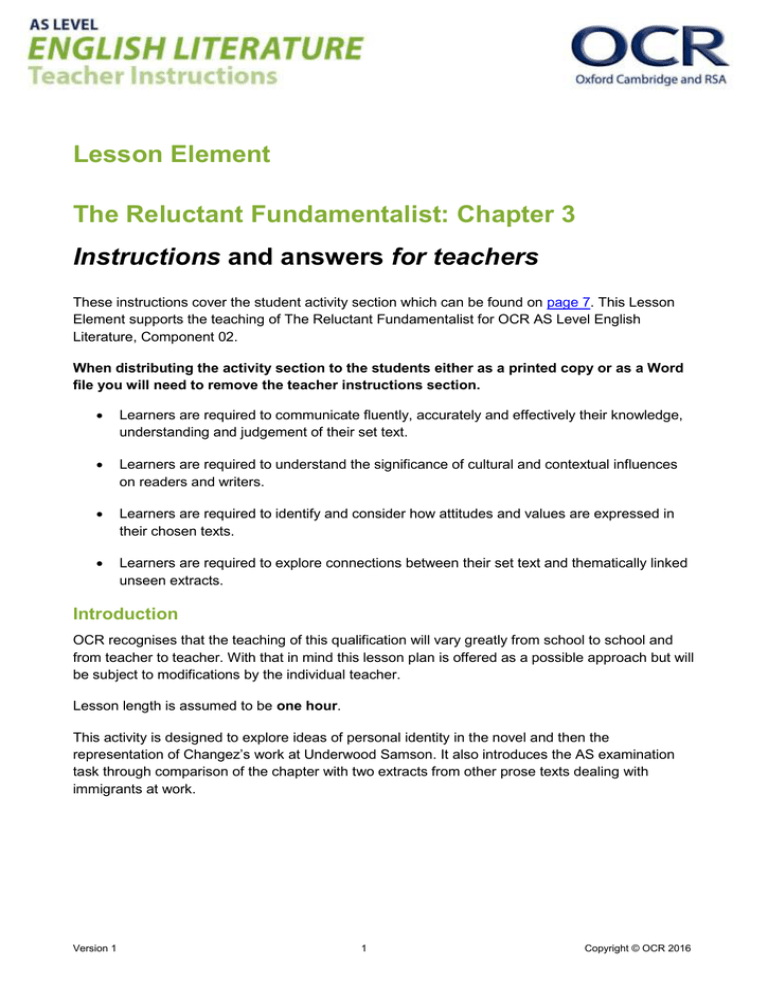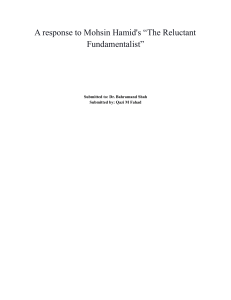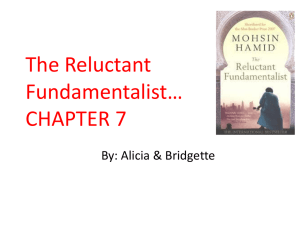The Reluctant Fundamentalist - Teacher's instructions and student activity - Lesson element, task 2 (DOC, 370KB) 02/03/2016
advertisement

Lesson Element The Reluctant Fundamentalist: Chapter 3 Instructions and answers for teachers These instructions cover the student activity section which can be found on page 7. This Lesson Element supports the teaching of The Reluctant Fundamentalist for OCR AS Level English Literature, Component 02. When distributing the activity section to the students either as a printed copy or as a Word file you will need to remove the teacher instructions section. Learners are required to communicate fluently, accurately and effectively their knowledge, understanding and judgement of their set text. Learners are required to understand the significance of cultural and contextual influences on readers and writers. Learners are required to identify and consider how attitudes and values are expressed in their chosen texts. Learners are required to explore connections between their set text and thematically linked unseen extracts. Introduction OCR recognises that the teaching of this qualification will vary greatly from school to school and from teacher to teacher. With that in mind this lesson plan is offered as a possible approach but will be subject to modifications by the individual teacher. Lesson length is assumed to be one hour. This activity is designed to explore ideas of personal identity in the novel and then the representation of Changez’s work at Underwood Samson. It also introduces the AS examination task through comparison of the chapter with two extracts from other prose texts dealing with immigrants at work. Version 1 1 Copyright © OCR 2016 Teacher Preparation Learning Objectives for the Lesson Objective 1 Students will be able to demonstrate an understanding of some of the key themes and ideas of The Reluctant Fundamentalist, with particular focus on ideas of identity.(AO1) Objective 2 Students will be able to analyse some of the key features of language and style of The Reluctant Fundamentalist. (AO2) Objective 3 Students will be able to compare The Reluctant Fundamentalist to selected prose extracts. (AO4) Recap of previous experience and prior knowledge Remind students of the Specification Aims, Assessment Objectives and text requirements for this component (especially AO4 – making links). Summarise chapters already covered. Prepare Copy hand-out with theoretical quotations about identity and extracts from John Lanchester’s Capital and Rose Tremain’s The Road Home. Task Instructions: 1. Ideas of Identity in The Reluctant Fundamentalist (10 minutes) Ask students to think about what gives them their sense of identity. Give some prompts (family, education, where they live or were born, social class, gender, sexuality, interests, appearance, religion, political beliefs) and allow them two minutes to list the things they identify as. Manage feedback and encourage explanation of ideas. 2. Ideas of Identity cont. (15 minutes) Distribute the hand-out to accompany this lesson and read the quotations from Stuart Hall, Mohsin Hamid, and Jonathan Raban. Link these ideas to the previous exercise: our identities are never fixed; we construct our own sense of self; will the things we identify as now still be true in 10 years? Get students working in pairs or threes on the following passages from the first three chapters of the novel: Chapter 1, p.3 ‘What did I think of Princeton?’ to p.5 ‘I certainly was, at least at first.’ Chapter 2, p.22 ‘”You give off a strong sense of home”’ to p.24 ‘they were its ruling class.’ Version 1 2 Copyright © OCR 2016 Chapter 3, p.36 ‘Like Manhattan?’ to p.37 ‘I would later depart.’ Encourage them to make connections to the theoretical extracts; the idea that the city is place where we can change our identities at will is especially relevant to the extract from Chapter 3. Possible areas for discussion: Identity from identification with a country’s history and culture (the reference to mosques in Lahore and Princeton’s Gothic buildings). Identity as a performance – Changez as the star of his own film set at Princeton. This is developed by the references to popular film culture throughout the novel which imply that there is something unreal about Changez’s American experience; this is reinforced when he talks of ‘the reality [he] had just left behind’ in Pakistan (p.148). Identity from his sense of being part of an intellectual elite but especially of being an international student at an American university (‘only the best and bright of us had been identified’). Identity from a sense of home. Is it ironic that Erica thinks Changez feels ‘solid’ because of his big family. Erica, despite her wealth and conventional family doesn’t feel ‘solid’. Changez is caught between two cultures, that of his affluent, entitled Princeton friends and his own affiliations with Pakistani traditions which prompt him to consider his American companions ‘as upstarts’. The city as a place to make and re-make identities (cf Raban) so Manhattan feels like ‘coming home’ to Changez. Globalisation and cultural eclecticism help to shape identity so Changez considers himself ‘immediately a New Yorker’ while finding reminders of his Pakistani heritage in the PakPunjab deli and hearing a song he’d danced to coming from the speakers of the South Asian Gay and Lesbian Association float during a parade. 3. Changez’s skin falls typically ‘in the middle of the color spectrum’. Working for Underwood Samson (15 minutes) Allocate to pairs or threes a section of Changez’s description of working for Underwood Samson which takes up most of Chapter 3 from pages 37 to 51. Ask students to list the different aspects of Changez’s experience of working for Underwood Samson and to identify their significance, commenting especially on Hamid’s choices of language. Possible areas for discussion: Version 1 3 Copyright © OCR 2016 Military language to describe Changez’s work and relationship to Underwood Samson which anticipates the idea of his being a Janissary later in the novel. Language of the theatre (‘the drama’ of the view from the lobby) which develops the ideas of Changez’s life in America as a performance; Wainwright’s ironic references to Top Gun and Star Wars later in the chapter have a similar function. Allegorical names suggest that Underwood Samson functions as metonym for America; Changez emphasizes the company’s power which is so great as to make Changez forget his Pakistani self (‘I did not think of myself as a Pakistani, but as an Underwood Samson trainee’). Hamid is perhaps critiquing American cultural imperialism here. The work is intense, highly demanding but extremely well rewarded. Food motif – eclectic (but healthy) food drawing on different cultural traditions. ‘Systematic pragmatism’, which Changez tells his listener ‘underpins your country’s success in so many fields’, is also a form of financial ruthlessness which admits no other considerations except efficiency and ‘maximum return’. Again, Hamid’s criticism of American capitalism. Creativity ‘ceded its primacy to efficiency’ which initiates a key binary in the novel between creativity/writing/literary culture and money. Ethnic and gender diversity of Changez’s group of new recruits but in fact all are tall, goodlooking, slim and from an elite university. Changez finds that his ‘natural politeness and sense of formality’ proves ‘perfectly suited’ to working for Underwood Samson as he’s accustomed to hierarchies. (Connect this back to the military images and the ‘ranking’ of ‘recruits’.) Intertextual reference to The Great Gatsby, another novel dealing with the ultimate emptiness of wealth, also contributes to the idea of a literary culture. 4. Comparison Task (15 minutes) Read out the extracts from Capital and The Road Home. You could either tackle both in the lesson or focus on just one, leaving the other for a homework task. Get students working in pairs comparing the representation of immigrants at work in the extracts with the depiction of Changez’s experiences with Underwood Samson. Possible areas for discussion (Lanchester): Both the extract and the novel deal with an immigrant at work. Changez and Quentina both highly educated but only Changez does a job which uses his talents. Version 1 4 Copyright © OCR 2016 Ironic, omniscient third person narrative perspective in Capital versus (unreliable) first person narrator in The Reluctant Fundamentalist. Urban setting but, whereas Changez is at the heart of power and wealth inside his Manhattan office, Quentina is marginalised outside in a suburban street. Focus on money in both but, whereas Changez is handsomely rewarded for his work, Quentina’s earnings are in inverse proportion to the money she generates. Military imagery in both. In the Capital extract this is for comic purposes (Quentina’s absurd uniform); in The Reluctant Fundamentalist, the military semantic field in Changez’s description of Underwood Samson is part of a larger and more sinister pattern of images. Possible areas for discussion (Tremain): Both the extract and the novel deal with an immigrant at work. Lev’s work is exceptionally poorly paid and routine. Ahmed’s Islamic identity is gently satirised through some self-revealing irony. Third person, focalised narrative in The Road Home versus (unreliable) first person narrator in The Reluctant Fundamentalist. Urban setting very different from the glamour of Manhattan in The Reluctant Fundamentalist. Very straightforward lexis and lengthy, multi-claused sentences emphasize the routine nature of Lev’s work. Interesting use of double negative (‘he wasn’t unhappy with his task’) which suggests some ambivalence on his part but also gratitude for the opportunity to make money. This contrasts with Changez who allows his work for Underwood Samson to entirely subsume his sense of self. 5. Summary and setting of homework task (5 mins) Choose an extract which deals with questions of cultural identity or which features and immigrant at work and ask students to undertake a close reading exercise, linking it to key ideas covered in the lesson. Version 1 5 Copyright © OCR 2016 We’d like to know your view on the resources we produce. By clicking on ‘Like’ or ‘Dislike’ you can help us to ensure that our resources work for you. When the email template pops up please add additional comments if you wish and then just click ‘Send’. Thank you. If you do not currently offer this OCR qualification but would like to do so, please complete the Expression of Interest Form which can be found here: www.ocr.org.uk/expression-of-interest OCR Resources: the small print OCR’s resources are provided to support the teaching of OCR specifications, but in no way constitute an endorsed teaching method that is required by the Board, and the decision to use them lies with the individual teacher. Whilst every effort is made to ensure the accuracy of the content, OCR cannot be held responsible for any errors or omissions within these resources. © OCR 2015 - This resource may be freely copied and distributed, as long as the OCR logo and this message remain intact and OCR is acknowledged as the originator of this work. OCR acknowledges the use of the following content: Please get in touch if you want to discuss the accessibility of resources we offer to support delivery of our qualifications: resources.feedback@ocr.org.uk Version 1 6 Copyright © OCR 2016 Lesson Element The Reluctant Fundamentalist: Chapter 3 Student Activity Ideas of Identity and the City: Within us are contradictory identities, continuously being shifted about. If we feel we have a unified identity from birth to death, it is only because we construct a comforting story or 'narrative of self' about ourselves. The fully unified, completed, secure and coherent identity is a fantasy. Instead, as the systems of meaning and cultural representation multiply, we are confronted by a bewildering, fleeting multiplicity of possible identities, any one of which we could identify with - at least temporarily. Stuart Hall, 'The Question of Cultural Identity' in Stuart Hall et al (eds.), Modernity and its Futures (Cambridge: Polity Press, 1992), p.277. The self we create is a fiction. Mohsin Hamid, ‘Enduring Love of the Second Person’ in Discontent and Its Civilisations (Harmondsworth: Penguin, 2105), p.79 In the city we can change our identities at will [...]; its discontinuity favours both instant-villains and instant-heroes impartially. The gaudy, theatrical nature of city life tends constantly to melodrama. Jonathan Raban, Soft City (London: Fontana, 1975), p.16 Version 1 7 Copyright © OCR 2016 Making Comparisons: This extract deals with a Zimbabwean immigrant working as a traffic warden in London. Quentina Mkfesi BSc, MSC (Political Science, University of Zimbabwe, thesis subject: Post-Conflict Resolution in Non-Post-Colonial Societies, with special reference to Northern Ireland, Spain and Chile) was on the lookout for non-residents parked in residents’ parking areas, for business permitholders parked in residents’ areas and vice versa, for expired permits of both types, for people who had overstayed their paid parking or – and this was a particularly fruitful issue in Pepys Road – for people who had misinterpreted the parking signs and paid for parking but were not parked in the dual-use, residents’ or paid-parking area, but were instead parked in the residents-only area. She was alert to cars parked carelessly, protruding into the public thoroughfare or with one wheel on the pavement. She could also issue tickets for out-of-date vehicle duty. She was not a cruel warden – she regularly allowed a period of grace for out-of-date residents’ permits and unpaid road tax. But she was a very sharp one. She was dressed in a dark green uniform accessorised with webbing in a paler shade of green, trousers which had white strap-like detailing on the bottom of the legs, and a peaked cap. She looked like the Marx Brothers’ idea of a colonel in the Ruritanian customs service from 1905. The government, the council, and the company Quentina worked for all publicly and repeatedly denied that there was a quota for issuing parking tickets. That was, everybody knew, a flat lie. Of course there was a quota. Quentina’s was for twenty tickets a day, yielding £1,200 in revenue if all the violators paid within the two weeks’ grace period, and usually more because many of them did not. If there were no appeals upheld – and Quentina, who was good at her job, had the lowest level of upheld appeals of any current employee of Control Services – the revenue in practice would be worth about £1,500 a day. If she worked 250 days a year that meant Quentina was generating revenue of £375,000 per annum. In return for that she was, in theory, paid £12,000, with four weeks’ paid holiday and no health or pension benefits. John Lanchester, Capital (2012) Lev travels to London from Eastern Europe, seeking work. In this extract, the owner of a kebab shop offers him a job. ‘So,’ said Ahmed,’ you want work? What work do you want?’ ‘Any work,’ said Lev. ‘Well,’ said Ahmed. ‘You are lucky. You came to the right place, because I am a Muslim.’ ‘Yes?’ said Lev. ‘The Koran teaches that deeds of unselfish kindness will be rewarded in Heaven. I’ve given you precious food, and for this unselfishness, I will find reward. But now I shall go further. I am going to give you work.’ Version 1 8 Copyright © OCR 2016 Lev waited. He wasn’t sure how much he’d understood. Ahmed asked him his name and what city he’d come from and Lev told him and Ahmed smiled and said: ‘A man may travel far, but his heart may be slow to catch up.’ ‘Sorry?’ said Lev. ‘Take no notice. I like to invent proverbs.’ Ahmed’s smile turned into a wide grin, then into laughter, and the laughter echoed all around the tiled and empty surfaces and Lev thought, suddenly, He’s playing games with me and the food and the water will not be free. Then Ahmed disappeared through a plastic fly curtain and Lev found himself alone. […] A long time seemed to pass before Ahmed returned. Onto the counter top he put down a tall cardboard box containing an overflowing pile of black-and-white leaflets, on which the name Ahmed’s Kitchen was written in twirly, backward-sloping script. Ahmed banged his fist down proudly onto the pile. ‘Your work,’ he said. ‘Deliver leaflets. OK?’ ‘Yes?’ ‘Yes. All round this neighbourhood. Everything residential. Smart houses. Shabby houses. Flats. B&Bs. Every private door. Check the basements especially. Many kebab people live in basements. Don’t bother with the hotels. Every leaflet you post in, I pay you 2p. Ten houses, 20p. A hundred houses £2. Perhaps you are a godless man, Lev, but today Allah has smiled on you. Eh?’ […] The weight of the leaflets in the carrier-bag became lighter as he completed the first three streets and came into a quiet square, where children played on a rough lawn, safe behind railings, and where the air was scented with privet. He was in a trance of delivery now: walk up the front steps, grab the leaflets, hurl them through the letter-box, walk down the front steps, go down again into the basement, examine the number of names, select the right number of leaflets, throw them in, climb back into the sunlight of the street, pass on to the next house … His legs ached a little, he wore his leather cap low, against the midday glare, but he wasn’t unhappy with his task. Before long, he calculated that he’d earned £1. Rose Tremain, The Road Home (2007). Version 1 9 Copyright © OCR 2016






